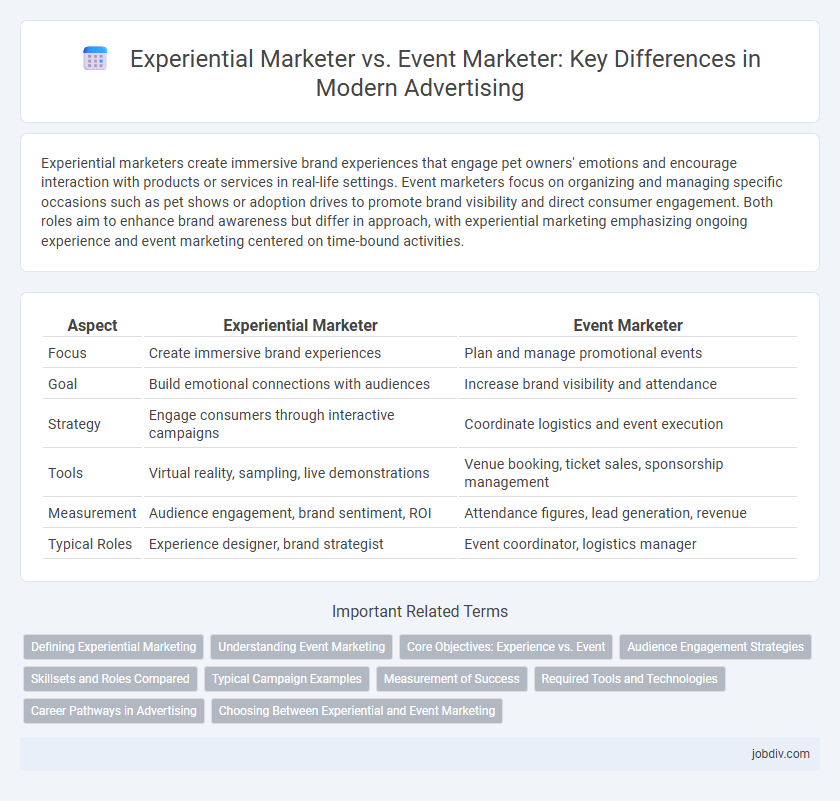Experiential marketers create immersive brand experiences that engage pet owners' emotions and encourage interaction with products or services in real-life settings. Event marketers focus on organizing and managing specific occasions such as pet shows or adoption drives to promote brand visibility and direct consumer engagement. Both roles aim to enhance brand awareness but differ in approach, with experiential marketing emphasizing ongoing experience and event marketing centered on time-bound activities.
Table of Comparison
| Aspect | Experiential Marketer | Event Marketer |
|---|---|---|
| Focus | Create immersive brand experiences | Plan and manage promotional events |
| Goal | Build emotional connections with audiences | Increase brand visibility and attendance |
| Strategy | Engage consumers through interactive campaigns | Coordinate logistics and event execution |
| Tools | Virtual reality, sampling, live demonstrations | Venue booking, ticket sales, sponsorship management |
| Measurement | Audience engagement, brand sentiment, ROI | Attendance figures, lead generation, revenue |
| Typical Roles | Experience designer, brand strategist | Event coordinator, logistics manager |
Defining Experiential Marketing
Experiential marketing creates immersive brand experiences that engage consumers on an emotional and sensory level, fostering deeper connections beyond traditional event setups. Unlike event marketers who manage logistics and event execution, experiential marketers design strategic, interactive campaigns that integrate storytelling with multi-sensory engagement to drive brand loyalty and advocacy. This approach leverages real-time feedback and data analytics to optimize consumer interaction and measure impact effectively.
Understanding Event Marketing
Event marketing centers on creating live, interactive experiences designed to promote products or brands and engage target audiences directly. It involves strategic planning and execution of events such as trade shows, product launches, and brand activations to generate lead opportunities and enhance brand visibility. Understanding event marketing requires recognizing its role in building customer relationships through immersive, memorable experiences that drive measurable business results.
Core Objectives: Experience vs. Event
Experiential marketers prioritize creating immersive and memorable brand experiences that engage multiple senses and foster emotional connections with the audience, aiming to build long-term brand loyalty. Event marketers focus on organizing and managing specific events to promote a product or service, with objectives centered on attendance, brand visibility, and immediate customer engagement. The core distinction lies in experiential marketing's emphasis on holistic, interactive brand experiences versus event marketing's focus on execution and event-specific goals.
Audience Engagement Strategies
Experiential marketers create immersive brand experiences that foster emotional connections and long-lasting impressions, leveraging sensory stimulation and interactive technology to engage audiences deeply. Event marketers focus on planning and executing specific events aiming to maximize attendance and real-time interaction, often using targeted promotions and strategic sponsorships to drive participation. Both prioritize audience engagement but differ in scope--experiential marketing centers on holistic brand interaction, while event marketing is anchored in successful event delivery and activation.
Skillsets and Roles Compared
Experiential marketers excel in creating immersive brand experiences that engage consumers on an emotional level, utilizing skills in storytelling, sensory design, and customer journey mapping. Event marketers specialize in planning and executing live events, focusing on logistics, vendor management, and audience engagement metrics to ensure seamless operations and measurable outcomes. Both roles require strong project management and communication skills, but experiential marketers emphasize creative innovation while event marketers prioritize operational efficiency.
Typical Campaign Examples
Experiential marketers design immersive brand activations such as pop-up shops and interactive product demos to engage consumers on a sensory level, creating memorable emotional connections. Event marketers focus on organizing structured gatherings like trade shows, conferences, and sponsorship-driven festivals that promote brand visibility and lead generation. Both approaches leverage unique touchpoints, but experiential campaigns prioritize direct audience interaction while event marketing emphasizes coordinated brand presence at large-scale functions.
Measurement of Success
Experiential marketers measure success through audience engagement metrics such as interaction time, emotional connection, and brand recall, emphasizing immersive brand experiences that foster long-term loyalty. Event marketers primarily focus on traditional KPIs like attendance numbers, lead generation, and immediate sales impact to evaluate the effectiveness of a specific event. Both approaches utilize data analytics and post-event surveys but differ in prioritizing qualitative emotional engagement versus quantitative outcomes.
Required Tools and Technologies
Experiential marketers leverage immersive technologies such as virtual reality (VR), augmented reality (AR), and interactive installations to create engaging brand experiences that foster deep emotional connections and enhance consumer interaction. Event marketers rely on event management software, registration platforms, and live-streaming technology to coordinate logistics, maximize attendance, and facilitate real-time audience engagement. Both roles require analytics tools to measure campaign effectiveness, but experiential marketing emphasizes sensory engagement tools while event marketing prioritizes operational and communication technologies.
Career Pathways in Advertising
Experiential marketers develop immersive brand experiences that create emotional connections, leveraging strategies like sensory engagement and storytelling to drive consumer loyalty. Event marketers specialize in planning and executing promotional events, managing logistics, vendor relationships, and on-site coordination to maximize brand visibility. Career pathways in advertising for experiential marketing often involve roles in brand strategy and consumer insights, while event marketing careers typically progress through event coordination, management, and experiential project oversight.
Choosing Between Experiential and Event Marketing
Choosing between experiential marketing and event marketing depends on brand goals and audience engagement strategies. Experiential marketing creates immersive, interactive brand experiences that foster emotional connections and long-term loyalty, while event marketing centers on organizing and promoting specific occasions to generate immediate buzz and attendance. Brands aiming for deep customer involvement should prioritize experiential marketing, whereas those seeking targeted reach and event-specific visibility may opt for event marketing.
Experiential Marketer vs Event Marketer Infographic

 jobdiv.com
jobdiv.com